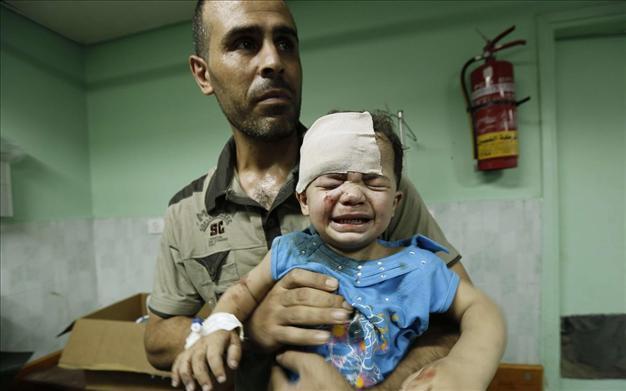Israel agrees four-hour Gaza ceasefire as UN rages over school strike
GAZA CITY - Agence France-Presse

A Palestinian child, wounded in an Israeli strike on a compound housing a UN school in Beit Lahia in the northern Gaza Strip, receives treatment at Kamal Edwan hospital in Beit Lahia early on July 30. AFP Photo
Israel agreed July 30 to observe a four-hour lull in Gaza several hours after a deadly strike on a school killed 16, drawing a furious response from a U.N. refugee agency. In a statement, the army said it had agreed to a humanitarian pause which was to begin at 12:00 GMT. But it said the lull would not apply in areas where the army was "currently operating" and warned those who had fled their homes not to return.The announcement came as the Israeli security cabinet was meeting in Tel Aviv to discuss an Egyptian proposal for a more permanent ceasefire, army radio reported. The temporary truce deal comes just hours after two Israel shells slammed into a U.N. school in the northern Gaza Strip where more than 3,000 people had sought shelter, killing at least 16 of them.
It was the second time in a week that a U.N. school had been hit, hiking the death toll in Gaza from 23 days of bloodshed to around 1,300 and drawing a furious denunciation from the head of the U.N. agency for Palestinian refugees, UNRWA.
"I condemn in the strongest possible terms this serious violation of international law by Israeli forces," said UNRWA Commissioner General Pierre Krahenbuhl, saying the school's location had been communicated to the Israeli army 17 times.
"No words to adequately express my anger and indignation," he wrote on his official Twitter account, saying that 3,300 people had been sheltering there at the time. "I call on the international community to take deliberate international political action to put an immediate end to the continuing carnage," he said.
Violence in Gaza claimed more than 70 lives on July 30, with the worst strike at the school in Jabaliya refugee camp. U.N. figures show up to 240,000 people have fled their homes in a territory which is home to 1.7 million Palestinians, leaving one in seven people homeless.
Most have sought refuge in more than 80 U.N. schools, although the agency has twice reported finding rockets stashed two of its uninhabited schools.
'All kids here'
Inside the school yard, several horses and donkeys lay dead in pools of blood as other terrified animals cowered nearby. Facing onto the yard was a classroom whose wall had been completely destroyed.
Inside, two young men wearing Palestinian boy scout scarves were engaged in the grisly task of collecting body parts. With no gloves, their hands were completely stained with blood as the picked up chunks of flesh and put them into thin plastic bags. "They're bombing houses, homes, schools - there's no protection," said Moin al-Athamna, one of those staying at the school, saying everyone had been sleeping when the first shell hit.
"They were all kids in there, young people," said Hisham al-Masri. "Why would they do this? Where can people go?" An AFP correspondent said the army had been pounding the area with tank fire for an hour prior to the incident.
International efforts to broker an end to the bloody conflict have so far led nowhere, with current efforts focused on a top-level Palestinian delegation, including Hamas and Islamic Jihad leaders, which was expected to visit Cairo in the coming days to discuss a new truce proposal.
And the Israeli security cabinet was also locked in discussions over an Egyptian truce initiative, army radio said several hours after reporting that troops had made a "significant advance" into the narrow coastal enclave.
On July 29 the Palestine Liberation Organisation (PLO) said it had garnered Hamas support for a 24-hour truce which would be discussed in Cairo.
Palestinian president Mahmud Abbas had been in touch with exiled Hamas chief Khaled Meshaal and had "proposed the 24-hour truce", senior official Nabil Shaath told AFP. "Meshaal and Hamas agreed." But Hamas said it had not so far agreed to any new truce and was waiting for Israel to show its hand first.
"When we have an Israeli commitment... on a humanitarian truce, we will look into it," spokesman Sami Abu Zuhri said. And Hamas's military chief Mohammed Deif released an audio statement saying there would be "no ceasefire without stopping the aggression and the end of the siege", referring to Israel's eight-year blockade on Gaza.
One fifth of victims are children: UN
U.N. figures indicate that nearly three quarters of those killed were civilians and more than a fifth of them children. At least seven children were killed during the morning, among them an 11-year-old disabled girl who died in a shelling in Gaza City, and a 16-year-old girl killed in a strike on central Gaza.
In Khan Yunis, an early strike killed nine members of one family, and several hours later, tank shelling killed seven members of another.
Yet another family of seven was killed in a strike on Tuffah in northeastern Gaza City, medics said. The violence raised the death toll on July 30 to 67, with the overall number of people killed in Gaza now standing at more than 1,300.
On the Israeli side, the conflict has cost the lives of 53 soldiers, all of whom were killed since the ground operation began, as well as two civilians and a Thai worker who were killed by rocket fire.
















